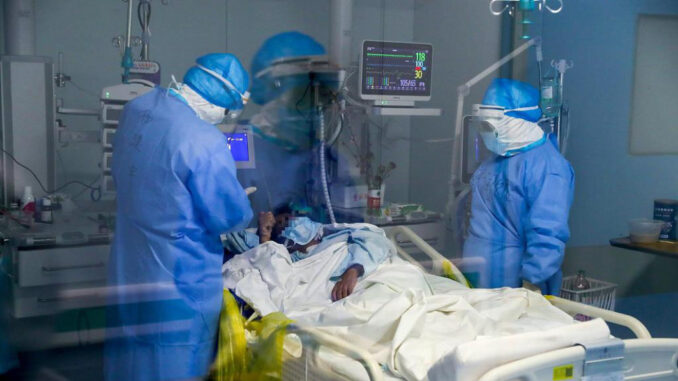
And never think of those who have been killed in the cause of Allah as dead. Rather, they are alive with their Lord, receiving provision…(Quran 3: 169).
He soon achieved renown for his dedication and for his passion for medical practice. Having worked for four decades, it was time for him to say goodbye to national service. He actually said goodbye to his employers- the National Health Service (NHS). But he could not say bye to his profession; he could not hang his stethoscope. He knew he had retired; he equally knew he was not tired. Thus, he volunteered to add life to life in this time of coronavirus pandemic even after forty years of meritorious service. He therefore went into the battle against COVID-19. He eventually answered the divine call to celestial reward, not service anymore.
Now how many medics have we lost to this on-going global pandemic? How many martyrs have we recorded? In order to answer this question, we must expand our data gathering to include the excluded in the backwaters of Asia, in parts of Africa, in Latin America, in North America and in Europe. How can estimate and correctly too the number of martyrs the world has recorded in the full knowledge that there are many heroes and heroines out there who would never gain mention simply because they on the periphery. Here I refer to care-givers, to pharmacists, nurses, lab-technologists, para-medics, drivers, cleaners etc. These are important soldiers in the on-going battle against COVID-19.
I was moved by the images I saw couple of days ago of a ward in New York that was full of COVID-19 patients. While the doctors and nurses were busy battling to resuscitate a patient, I saw a cleaner who was dutifully busy mopping the floor, trying to ensure that the hospital was free of pathogens and bugs. I knew that she would probably not and never be celebrated. But I equally knew that she was running the same risk like the medics and the nurses. She was equally on the battlefront. She risked being infected. She could also die of the infection. She was a martyr waiting for the ‘call’.
I then solaced myself with these entreaties from the Last Testament- “Think not of those, who are slain in the way of Almighty, as dead. Nay, they are living. With their Lord they have provision. Jubilant (are they) because of that which the Almighty has bestowed upon them of His bounties, rejoicing for the sake of those who have not joined them but are left behind: that there no fear shall come upon them neither shall they grieve. They rejoice because of favors from the Almighty and kindness; He wasteth not the reward of the believers. (Quran 3: 169-71)
Now I find this question very pertinent- exactly what is sweeter than life? Probably nothing. Now this – exactly what could be sourer than death? I say: life in hell. Whenever you put the realities of life and death on the same scale, you probably would come away with the conclusion that nothing could be more instructive than death; that nothing could be more sobering than seeing people you know die in the middle of their life; that nothing could be more teachable than having to die, in line with John Green, ‘in the middle of a sentence’.
Yes. Alfa Sa’adu and other martyrs have all died at the right time. This is because there is no untimely death in the Islamic world-view. Properly understood, the reality of death is not the same thing as bringing forth a premature baby. While certain intervening circumstances could force a woman to labour before the expected date of delivery, the man who ‘kisses’ death must have, a priori, exhausted his divinely ordained treasury on mother-earth. In other words, I know, as a matter of fact, that nobody dies before his appointed date; that the Almighty does not commit errors; that there is no after-thought in the divine scheme.
At this moment of grief, Dr Alfa’s wife is probably looking up to the skies as if in search of the “eyes” of the divine. At this moment, the sister of our deceased brother is probably holding on to her head as if the grief she feels is restricted only to that part of her body. Yes. Nothing reminds us all of the temporality of this life better than occasions like this. Arthur Schopenhauer, says: “the deep pain that is felt at the death of every friendly soul arises from the feeling that there is in every individual something which is inexpressible, peculiar to him or her alone, and is, therefore, absolutely and irretrievably lost at his/her death; that there are things that we do not want to happen but which we have to accept, things we do not want to know but which we have to learn, and people we cannot live without but, in circumstances like this, have to let go”.
While we mourn all those who have been martyred by this pandemic, I pray, once again, that they meet with the eternal Rahmah of their Creator. I pray that their circumstance becomes like that of those who, while they are being mourned by their friends, angels are rejoicing for having had the opportunity of ushering them into celestial bliss and from ‘behind the veil’.
(08122465111 for text messages only)
Afis Ayinde Oladosu Ph.D
Professor of Middle Eastern, North African and Cultural Studies
Dean, Faculty of Arts,
University of Ibadan,
Ibadan, Nigeria


Be the first to comment